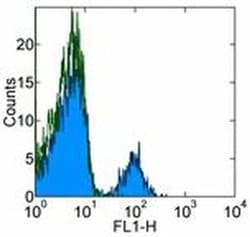Learn More
Invitrogen™ CD22 Monoclonal Antibody (eBio4KB128 (4KB128)), eBioscience™, Invitrogen™
Mouse Monoclonal Antibody
Supplier: Invitrogen™ 14022937

Description
The eBio4KB128 MAb recognizes human CD22 (Siglec-2), which is a member of the siglec subgroup of the Ig superfamily. CD22 is a type I transmembrane glycoprotein composed of two polypeptide chains, CD22alpha and CD22beta, of 130 and 140 kDa respectively, produced by alternative splicing of the CD22 gene. CD22 is expressed at high levels on mature B cells and B cell lymphomas. The extracellular portion of CD22 contains seven Ig-like domains, some of which are capable of binding ligands with sialic acid moieties expressed on epithelial, endothelial, B and T cells. The intracellular portion of CD22 contains 6 tyrosine residues contained within immunotyrosine-based inhibitory motifs (ITIM) and immunotyrosine-based activation-like motifs, which are phosphorylated upon B-cell receptor engagement, which enables CD22 to participate in the positive and negative regulation of B-cell receptor signaling.
CD22 (BL-CAM) is a type 1 integral membrane glycoprotein with molecular weight of 130 to 140 kDa. CD22 is expressed in both the cytoplasm and cell membrane of B-lymphocytes. CD22 antigen appears early in B-cell lymphocyte differentiation at approximately the same stage as the CD19 antigen. Unlike other B-cell markers, CD22 membrane expression is limited to the late differentiation stages comprised between mature B cells (CD22+) and plasma cells (CD22-), and may thus prove useful in phenotyping mature leukemias. CD22 is also strongly expressed in hairy cell leukemia. CD22 preferentially binds to alpha2,6-linked sialic acid. The sialic acid recognition site can be masked by cis interactions with sialic acids on the same cell surface. Upon ligand induced tyrosine phosphorylation in the immune response seems to be involved in regulation of B cell antigen receptor signaling. CD22 plays a role in positive regulation through interaction with Src family tyrosine kinases and may also act as an inhibitory receptor by recruiting cytoplasmic phosphatases via their SH2 domains that block signal transduction through dephosphorylation of signaling molecules. CD22 is also strongly expressed in hairy cell leukemia. CD22 is also positive in diffuse large B-cell lymphoma and nodular lymphocyte predominance Hodgkin's lymphoma, but negative in classical Hodgkin's lymphoma.
Specifications
| CD22 | |
| Monoclonal | |
| 0.5 mg/mL | |
| PBS with 0.09% sodium azide; pH 7.2 | |
| P20273 | |
| CD22 | |
| Affinity Chromatography | |
| RUO | |
| 933 | |
| 4°C | |
| Liquid |
| Flow Cytometry, Immunohistochemistry | |
| eBio4KB128 (4KB128) | |
| Unconjugated | |
| CD22 | |
| A530093D23; B-cell receptor CD22; BL-CAM; B-lymphocyte cell adhesion molecule; B-lymphocyte cell adhesion molecule (BL-CAM); Cd22; CD22 antigen; CD22 molecule; FLJ22814; Lectin 2; Leu-14; Lyb8; Lyb-8; MGC130020; sialic acid binding Ig-like lectin 2; sialic acid-binding Ig-like lectin 2; Sialic acid-binding Ig-like lectin 2 (Siglec-2); Siglec2; Siglec-2; T-cell surface antigen Leu-14 | |
| Mouse | |
| 2 mg | |
| Primary | |
| Human | |
| Antibody | |
| IgG1 κ |
Safety and Handling
The Fisher Scientific Encompass Program offers items which are not part of our distribution portfolio. These products typically do not have pictures or detailed descriptions. However, we are committed to improving your shopping experience. Please use the form below to provide feedback related to the content on this product.
